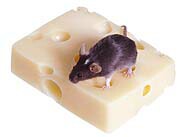 |
 |
 |
||
    |
||||
|
||||

Mice Study Shows How 'Fat Gene' Works
Those without FTO gene stay slim without dieting or added exercise, German researchers say|
|
HealthDay
Monday, February 23, 2009
 SUNDAY, Feb. 22 (HealthDay News) -- Mice without a particular form of an obesity-linked gene are thinner than mice carrying the gene, even though they exercise similarly and gobble up just as much food.
SUNDAY, Feb. 22 (HealthDay News) -- Mice without a particular form of an obesity-linked gene are thinner than mice carrying the gene, even though they exercise similarly and gobble up just as much food.
So conclude German investigators, who reported the finding in the Feb. 22 issue of Nature. According to the team, this is the first time that scientists have been able to explain how an obesity-linked gene -- in this case the FTO gene -- may predispose a person to be either skinny or obese.
"These animals are eating as much as the control animals but burning calories through a non-exercise mediated pathway," said one expert, Dr. Stuart Weiss, a clinical assistant professor of medicine at New York University School of Medicine in New York City.
Previous research had determined that having the "fat" variant of the FTO gene can add as much as 3 kilograms (6.6 pounds) to a person's heft.
In the current study, "the gene was knocked out, so there was no product of the gene in the body," explained another expert, Weimin He, an assistant professor at Texas A&M Health Science Center's Institute of Biosciences and Technology in Houston.
Mice lacking the FTO gene displayed slowed growth after birth (though not before) and less fat tissue. And by the age of 6 weeks, these mice had 30 percent to 40 percent less weight than their "normal" counterparts. Lean mass was also lower, but to a lesser extent.
So how did the FTO-less rodents stay so svelte, despite similar diet and exercise? "The study authors say it's because of increased energy expenditure," He said. "Now the question is, why?"
The German team, led by Ulrich Ruther of the University of Dusseldorf, investigated further to try and find an answer.
Blood levels of the hormone leptin, which helps control appetite and the balance of energy-in and energy-out in the body, were lower in the mice carrying the gene variant in question, the team found. This was expected, as leptin is produced by fat tissue.
Levels of adiponectin, another hormone involved in metabolic processes, were increased in the mice. Lower levels of adiponectin are associated with obesity.
The scientists were able to rule out changes to the hypothalamus, a part of the brain involved in "energy homeostasis" or balance, and they also ruled out alterations in glucose metabolism as reasons for the increased leanness.
Adrenaline levels, however, were found to be higher in the lean mice. "This is the interesting part," He said. "Why did adrenaline levels increase? There are several unanswered questions."
Once questions like those are answered, the findings may pave the way for more effective treatments to combat obesity and its myriad complications.
Of course, there are well-known ways of losing weight: lifestyle changes. These are "long-term proven strategies but people won't do them," Weiss said. "People are not comfortable following long-term diet and exercise plans." And with obesity rates continuing to soar in the United States, "we need medical approaches," he said.
HealthDay
Copyright (c) 2009 ScoutNews, LLC. All rights reserved.
Related News:
More News on this Date
Related MedlinePlus Pages:
| Home | Health Topics | Drugs & Supplements | Encyclopedia | Dictionary | News | Directories | Other Resources | |
| Disclaimers | Copyright | Privacy | Accessibility | Quality Guidelines U.S. National Library of Medicine, 8600 Rockville Pike, Bethesda, MD 20894 National Institutes of Health | Department of Health & Human Services |
Date last updated: 23 February 2009 |
